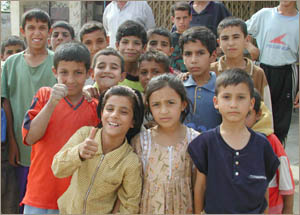 |
 |  |
|||||||||
 |
Home | The Sunni Heartland | The Unexpected War | Paying the Price |
|||||||||
|
Paying the Price The children share their nightmares.
At Yarmouk elementary school, Iraqi psychologists from the University of Baghdad read out a long questionnaire. Safe Abdul Result and Mason Karim are part of a university project to assess the affects of the war. "Listen to me boys and girls, there is no electricity now, which one of you is afraid to go into the dark and empty places?" asks Masoon Karim. Hands shoot up. How many have trouble sleeping? More hands reach out. Do you have trouble concentrating? Eating? Are you afraid of loud noises? Most of the children raise their hands. "Which one of you has bad dreams about war? " asks Karim. "I dreamt that while I'm walking, they fire a missile on me from an airplane," says one boy, "and this dream has been coming to me all the time. I've been having this dream for a long time." A girls shares her nightmare, "I dreamt that the Americans came to our house and they destroyed half of it, and we got lost and we couldn't go back home." Flashbacks, nightmares, fear of the dark or loud noises are consistent with the symptoms of posttraumatic stress disorder. Untreated, it can last a lifetime "Many kids who are normal are reluctant to join the school, reluctant to sit for the exam, reluctant to do their homework - even reluctant to play - and don't enjoy playing, they do not enjoy life. And this is a tragedy," says Iraqi psychiatrist Ali Haseem. "These are traumatized kids. Kids out of control, and the teacher bangs on a desk, and screams at them." When school opened after the war, teachers at Yarmouk school say some students did not come back, the children who did seemed different; more aggressive, more anxious. While researchers from University of Baghdad can document the problem, there's not much they can do about it. There are no programs, or experts to run them says Dr. Haseem. The international teams which rushed into Bosnia, Kosovo and Rwanda have not come to Iraq. "We can offer the best that we can do. We have little expertise...In the whole of Iraq, we don't have any child psychiatrists-believe it or not. Not a one." |
||||||||||
